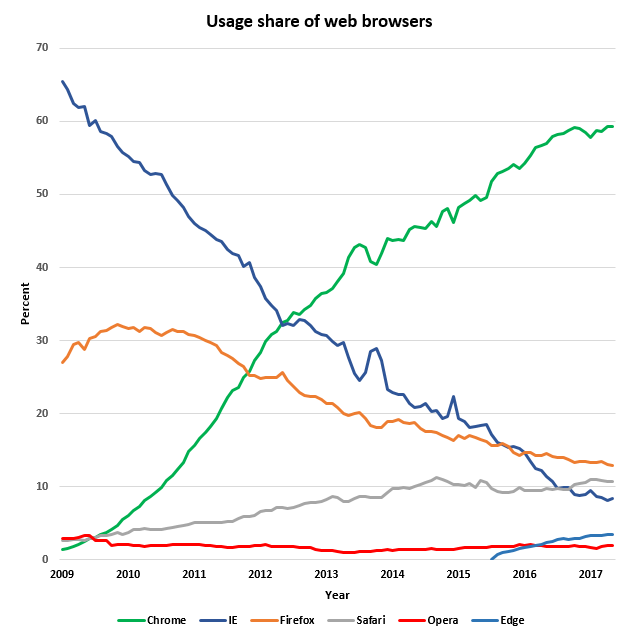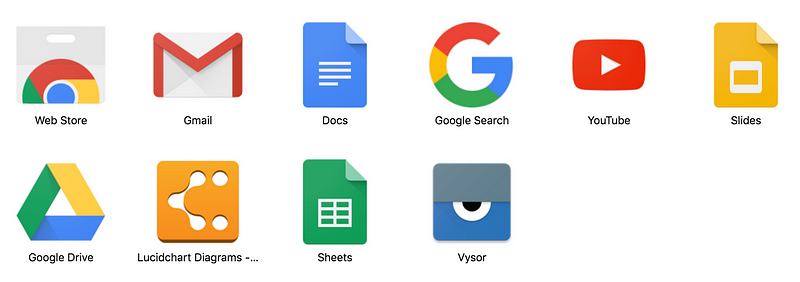Happy 10th Birthday To The Browser Renders The Web

Happy 10th Birthday To The Browser Renders The Web
Well that was a quick decade. This week is the 10th birthday of Google Chrome. It is now a browser that most of us turn too, and one that has caused one of the most radical changes on the Internet: the drive towards HTTPs. So if Chrome says jump, the industry jumps. For it’s 10th birthday, Google has released a new user interface. On Apple iOS:

and on Android:

In 2008, we used Internet Explorer (IE) on our Window’s desktops, but, in 2018, we now have fallen out of love with IE, and it’s a world of Chrome, Android, and iOS. Our desktop applications just seem so dated, and it’s too our browsers and our mobile applications that we increasingly turn too. So this is a story of how an application had a virtual monopoly in the market but crashed its market share due to a lack of development, weak innovation, and a poor user experience.
From a base of more than half of the market in 2008, IE has fallen to less than 10%. Even its rebranding with Edge has failed to boost its share. Chrome, though, has climbed to over half of all the browser traffic used:

Firefox peaked around 2010 but has fallen back, and with Safari — and its dominance on Apple systems — that has gained over the years. Why did this happen? Well, IE possibly focused on being a browser which tried to cover too many environments, especially focused on enterprise applications. The rise of browsing at home and on mobile devices have called for a more efficient browser and one which did not bring the baggage of the Window’s operating system. The poor look of IE just didn’t work for many users, and the first thing that many users would do on a new system was to install Google Chrome.
A core part of the success of Chrome is the way that developers have adopted it as the standard way to test their applications. At one time it was IE, but now your code must render on Chrome. The way that Chrome integrated debugging tools and new methods of integrating JavaScript were some of the reasons that developers used it as the browser of choice:

Google, too, have managed to champion the adoption of HTTPs, and increased their credibility on the browser space, with a large scale adoption due to it Chrome marking sites that do not support HTTPs, as insecure.
But, one of the key drivers for its success is the way that it integrates into the wide range of Google applications:

Chrome, too, is also conducting experiments around quantum-robust cryptography. With Chrome Canary we see a string of “CECPQ1” for the cryptography method and which defines their quantum-robust method of key exchange:

Browsers, though, have become part of a global spying network, and track the user with cookies. But there’s a change coming, and it’s one that is not in Google’s favour to like. With Firefox 65, the browser will start to block cross-site tracking, strip cookies and block storage access from third-party tracking content. This will stop the tracking of users across sites, and where it is thought that more than 50% of the load time on pages relates to the processing of these trackers. This speed improvement and focus on privacy could start to turn the tide against Chrome.
Conclusions
As a developer, I still use Firefox first, but my desktop contains Chrome, Opera and Safari. The one browser I never use is Internet Explorer, or Edge, as looks terrible, and never quite renders as well as the others. Something needs to change soon for any of the other browsers to have any chance against Chrome.
Some would say that perhaps Microsoft needed to lose its grip on the browser market, and concentrate on Office, Windows and Azure. So did Microsoft want to become more of a back-end company than one which had too much dominance in the IT space? Google, now, is facing these questions, with its dominance across many key areas, such as for its browser, the Android operating system, and in search engines. If it uses its dominance in one of these fields, to promote its own products and services of another area, it is in great risk in being fined, and in danger of having these business areas split apart.
For just now, Chrome is most often the place that we often view the Web, and is now leading the push for improved security.